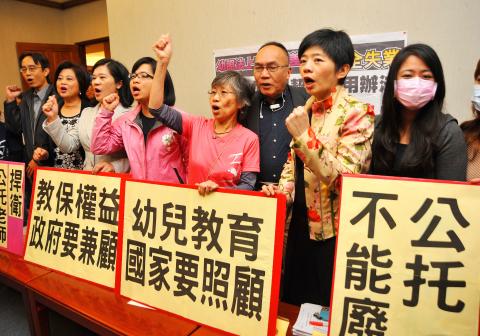A dozen teachers from daycare centers nationwide yesterday said that a recently revised law violates their employment rights and urged the government to revise the regulation.
Under the new law, qualified teachers applying for work at a center that cares for children under the age of six are required to take the same tests as jobseekers with no experience, Alliance of Educare Trade Unions convener Wang Su-ying (王淑英) told a press conference.
“This puts an unnecessary burden on experienced, hardworking teachers because they need to take time off from work to prepare for exams,” she said, accompanied by legislators.

Photo: George Tsorng, Taipei Times
“You cannot grade patience and love,” Chinese Nationalist Party (KMT) Legislator Chiang Hui-chen (江惠貞) said.
Chiang, who was responsible for local daycare center affairs when she headed the Banciao District Government, said that qualified teachers should be accorded certain privileges when taking tests.
According to the Childcare and Preschool Education Act (公立幼兒園契約進用人員之進用考核及待遇辦法), which took effect on Jan. 1, all daycare centers and kindergartens that accept children between the ages of two and six are designated “preschools.”
Teachers who wish to work at a preschool need to pass exams held by the local government. A grace period of one or two years has been given for schools to adjust to the new requirement.
“A good teacher needs a good working environment,” Democratic Progressive Party Legislator Lin Shu-fen (林淑芬) said.
Allowances should be made for those who are already doing a good job looking after children, Lin said, proposing an amendment to the law to ease the concerns of daycare centers and parents.
The Council of Labor Affairs issued a press statement in response to the daycare teachers’ demands.
The employment rights of preschool staff are stipulated in the Labor Standards Act (勞動基準法), which forbids an employer from laying off employees without legal grounds, the statement said.

CHANGING LANDSCAPE: Many of the part-time programs for educators were no longer needed, as many teachers obtain a graduate degree before joining the workforce, experts said Taiwanese universities this year canceled 86 programs, Ministry of Education data showed, with educators attributing the closures to the nation’s low birthrate as well as shifting trends. Fifty-three of the shuttered programs were part-time postgraduate degree programs, about 62 percent of the total, the most in the past five years, the data showed. National Taiwan Normal University (NTNU) discontinued the most part-time master’s programs, at 16: chemistry, life science, earth science, physics, fine arts, music, special education, health promotion and health education, educational psychology and counseling, education, design, Chinese as a second language, library and information sciences, mechatronics engineering, history, physical education

The Chinese military has boosted its capability to fight at a high tempo using the element of surprise and new technology, the Ministry of National Defense said in the Quadrennial Defense Review (QDR) published on Monday last week. The ministry highlighted Chinese People’s Liberation Army (PLA) developments showing significant changes in Beijing’s strategy for war on Taiwan. The PLA has made significant headway in building capabilities for all-weather, multi-domain intelligence, surveillance, operational control and a joint air-sea blockade against Taiwan’s lines of communication, it said. The PLA has also improved its capabilities in direct amphibious assault operations aimed at seizing strategically important beaches,

‘MALIGN PURPOSE’: Governments around the world conduct espionage operations, but China’s is different, as its ultimate goal is annexation, a think tank head said Taiwan is facing a growing existential threat from its own people spying for China, experts said, as the government seeks to toughen measures to stop Beijing’s infiltration efforts and deter Taiwanese turncoats. While Beijing and Taipei have been spying on each other for years, experts said that espionage posed a bigger threat to Taiwan due to the risk of a Chinese attack. Taiwan’s intelligence agency said China used “diverse channels and tactics” to infiltrate the nation’s military, government agencies and pro-China organizations. The main targets were retired and active members of the military, persuaded by money, blackmail or pro-China ideology to steal

DEADLOCK: As the commission is unable to forum a quorum to review license renewal applications, the channel operators are not at fault and can air past their license date The National Communications Commission (NCC) yesterday said that the Public Television Service (PTS) and 36 other television and radio broadcasters could continue airing, despite the commission’s inability to meet a quorum to review their license renewal applications. The licenses of PTS and the other channels are set to expire between this month and June. The National Communications Commission Organization Act (國家通訊傳播委員會組織法) stipulates that the commission must meet the mandated quorum of four to hold a valid meeting. The seven-member commission currently has only three commissioners. “We have informed the channel operators of the progress we have made in reviewing their license renewal applications, and